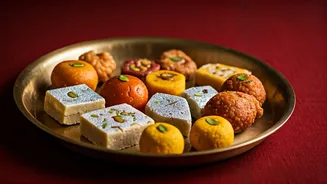Sweet Offerings Abound
Diwali, the festival of lights, is a time of immense joy and spiritual significance, marked by the worship of Goddess Lakshmi and Lord Ganesha. Central
to these celebrations is the offering of food, each dish carrying a unique symbolism and historical relevance. These food offerings are not just mere sustenance; they represent gratitude, prosperity, and the hope for a bright future. The tradition of offering specific foods has been passed down through generations, making it an integral part of Diwali rituals. The selection of these foods reflects the deep reverence for the deities, creating a sense of unity and celebration during the festive period. Each sweet delicacy contributes to the overall festive spirit, enhancing the auspiciousness of the occasion and fostering a sense of community among the celebrants.
Ladoo: Blissful Balls
Ladoo, a staple sweet across India, holds a special place in Diwali festivities, particularly as a favorite of Lord Ganesha. Typically made from gram flour (besan), semolina (sooji), or wheat flour, ladoos are deep-fried and then sweetened with sugar or jaggery. Their round shape symbolizes wholeness and perfection. Offering ladoos to Ganesha is believed to bring good luck, prosperity, and success in endeavors. The preparation of ladoos involves meticulous attention to detail, from the precise ratio of ingredients to the shaping of the balls. Each bite of the ladoo, with its rich sweetness and texture, embodies the joy and blessings of the festival. These delectable treats not only satisfy the sweet tooth but also serve as a reminder of the devotion and faith that drive the celebrations.
Kheer: Rice Pudding Delight
Kheer, a creamy rice pudding, is another important offering. It's made by simmering rice in milk with sugar, often flavored with cardamom, saffron, and nuts. This dish represents purity and is frequently offered to Goddess Lakshmi. The slow cooking process of kheer symbolizes patience and perseverance, qualities revered during the festival. Kheer's smooth texture and rich taste reflect abundance and prosperity, aligning with the core values of Diwali. The addition of nuts like cashews, almonds, and pistachios further enhances its auspiciousness, signifying wealth and good fortune. Preparing kheer is often a family affair, involving sharing stories and traditions, fostering a sense of togetherness and enhancing the festive mood.
Barfi: Milk-Based Bliss
Barfi, a dense, fudge-like sweet made from milk solids (khoya or mawa), sugar, and often flavored with cardamom or other spices, is a common offering during Diwali. It represents purity and the abundance of blessings. Barfi can be prepared in different flavors, each adding a unique touch to the offering, from plain milk to pistachio or almond. Its simple yet elegant appearance and rich taste make it a beloved choice for Diwali. The meticulous process of reducing milk solids to the perfect consistency requires skill, reflecting the care and dedication associated with the festival. The serving of barfi is often accompanied by other sweets, creating a delightful spread that symbolizes prosperity and happiness for all.
Peda: Milk-Based Disc
Peda, similar to barfi but with a distinct disc shape, is made from thickened milk, sugar, and cardamom. This sweet, commonly offered to deities, symbolizes a deep sense of devotion. It signifies purity and spiritual enlightenment. The preparation of peda is a skilled process, with the correct ratio of ingredients essential for the desired consistency. The smooth texture and rich flavor of peda make it a popular treat during Diwali. Offering peda is a gesture of reverence and respect for the divine, reflecting the values of humility and faith celebrated during the festival. The simple elegance of peda makes it a cherished part of the Diwali celebrations.
Halwa: Pudding Perfection
Halwa, a sweet pudding often made from semolina (sooji), wheat flour (atta), or carrots (gajar), is a versatile dessert offered to deities. This sweet dish demonstrates the variety and creativity of Diwali cuisine. Halwa is cooked with ghee, sugar, and flavored with cardamom and nuts, symbolizing the abundance of blessings. Each variety of halwa offers a unique texture and taste. The preparation of halwa involves a careful balance of ingredients and techniques, signifying the effort and commitment to celebrating the festival. The sharing of halwa brings joy and unity, fostering a sense of community during the auspicious occasion. Halwa is a testament to the joy and shared experiences that form the heart of Diwali.
Puri & Sabzi
Puri and sabzi, a classic combination, are often included in the Diwali offerings. Puri, deep-fried puffed bread, is a symbol of prosperity. Paired with various vegetable preparations (sabzi), this combination is a complete meal. The crispiness of the puri and the flavorful sabzi creates a satisfying offering. Preparing these involves culinary skills. The act of sharing puri and sabzi signifies the importance of togetherness during the festival. The meal is not just about sustenance; it symbolizes sharing and caring, strengthening the bonds of family and community during Diwali.
Malpua: Sweet Pancake
Malpua, a sweet pancake, is another dish often offered. The pancakes are often made from flour, milk, and sugar, and then deep-fried. Soaked in sugar syrup, these treats are a symbol of sweetness and prosperity. Offering malpua to the deities reflects the joy and festivity of Diwali. The preparation and the flavors are unique, each ingredient bringing a distinct richness to the table. Sharing malpua during Diwali is a gesture of hospitality and goodwill. Its sweetness brightens the celebrations, becoming a delightful part of the festive traditions.
Coconut Ladoo: Tropical Treat
Coconut ladoos are a popular choice, symbolizing purity and abundance. These ladoos are made from grated coconut, sugar, and cardamom. The coconut represents purity and the gifts of nature, making the ladoos an ideal offering. Their easy preparation and refreshing taste make them a favorite. Sharing coconut ladoos reflects a spirit of generosity, a core Diwali value. The simple yet delightful nature of coconut ladoos adds to the joy and the blessings associated with Diwali celebrations, making them a significant part of the festive offerings.












